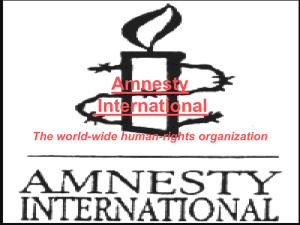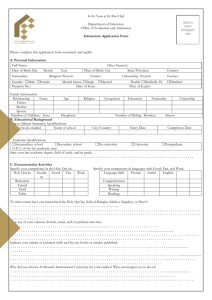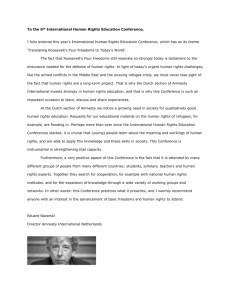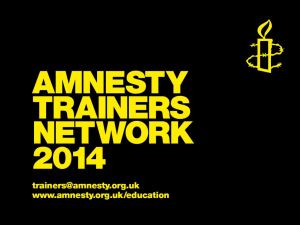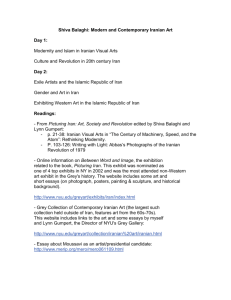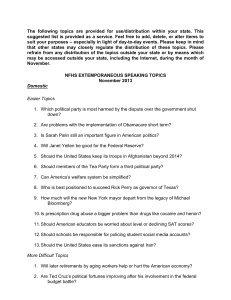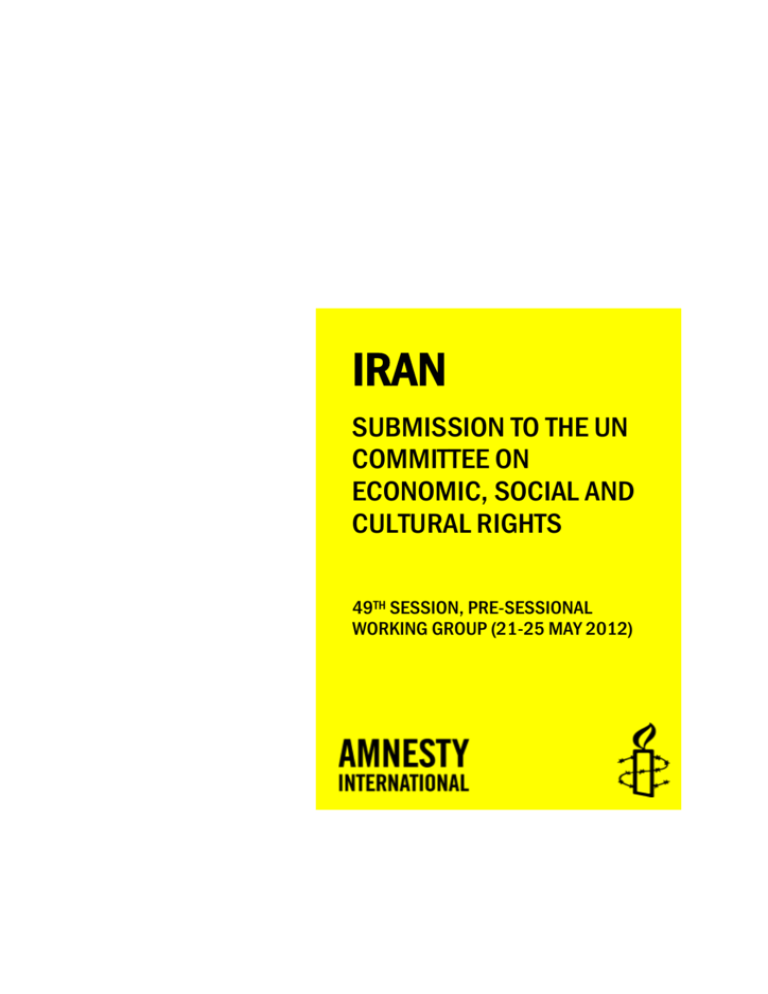
IRAN
SUBMISSION TO THE UN
COMMITTEE ON
ECONOMIC, SOCIAL AND
CULTURAL RIGHTS
49TH SESSION, PRE-SESSIONAL
WORKING GROUP (21-25 MAY 2012)
Amnesty International Publications
First published in 2012 by
Amnesty International Publications
International Secretariat
Peter Benenson House
1 Easton Street
London WC1X 0DW
United Kingdom
www.amnesty.org
© Amnesty International Publications 2012
Index: MDE 13/019/2012
Original Language: English
Printed by Amnesty International, International Secretariat, United Kingdom
All rights reserved. This publication is copyright, but may be reproduced by any
method without fee for advocacy, campaigning and teaching purposes, but not
for resale. The copyright holders request that all such use be registered with
them for impact assessment purposes. For copying in any other circumstances,
or for reuse in other publications, or for translation or adaptation, prior written
permission must be obtained from the publishers, and a fee may be payable.
To request permission, or for any other inquiries, please contact
copyright@amnesty.org
Amnesty International is a global movement of more than
3 million supporters, members and activists in more than 150
countries and territories who campaign to end grave abuses of
human rights.
Our vision is for every person to enjoy all the rights enshrined
in the Universal Declaration of Human Rights and other
international human rights standards.
We are independent of any government, political ideology,
economic interest or religion and are funded mainly by our
membership and public donations.
CONTENTS
Introduction ................................................................................................................................... 4
Article 6, 7 and 2: right to work and just and favourable conditions of work ..................................... 4
1. Discrimination in the field of employment on grounds of ethnic or religious identity, or gender4
Article 8: right to form independent trade unions and to function freely ......................................... 6
2. Ban on forming independent trade unions .............................................................................. 6
3. Draft reform of Labour Code further undermines the right to form independent trade unions ..7
4. Persecution of labour rights activists ........................................................................................7
5. Reprisals for striking ............................................................................................................... 8
Articles 10 and 2: Right of everyone to enter marriage with free consent ........................................ 8
6. Very low and discriminatory minimum ages of marriage and forced and early marriage .......... 8
Article 11 and 2: Right to adequate housing .................................................................................... 9
7. Discrimination in the enjoyment of the right to adequate housing ........................................... 9
Articles 13 and 2: Right of everyone to education without discrimination of any kind ..................... 11
8. Discriminatory limits placed on access to higher education based on gender .......................... 11
9. Limits placed on higher education based on political activities ...............................................12
10. Limits placed on higher education based on membership of the Baha’i faith......................... 13
11. Discrimination on the basis of sexual orientation and gender identity: Article 2 ....................14
4
Iran
Submission to the Committee on Economic, Social and Cultural Rights
INTRODUCTION
This briefing is submitted by Amnesty International in advance of the adoption by the Committee
on Economic, Social and Cultural Rights (the Committee) of a list of issues prior to the Committee’s
consideration of the Islamic Republic of Iran’s second periodic report on its implementation of the
International Covenant of Economic Social and Cultural Rights (hereafter the Covenant). This
briefing presents a range of concerns of Amnesty International on Iran’s failure to adequately
implement Articles 2, 6, 7, 8, 10, 11, 12 and 13 of the Covenant. In particular, Amnesty International
is concerned about the ban on independent trade unions, the persecution of labour activists, the
limits placed on higher education as a consequence of political activity, faith, or gender, and the
discrimination faced by members of the lesbian, gay, bisexual and transgender community.
Amnesty International intends to submit additional information to the Committee in advance of its
consideration of the report submitted by the Islamic Republic of Iran.
ARTICLE 6, 7 AND 2: RIGHT TO WORK AND JUST AND
FAVOURABLE CONDITIONS OF WORK
1. DISCRIMINATION IN THE FIELD OF EMPLOYMENT ON GROUNDS OF ETHNIC
OR RELIGIOUS IDENTITY, OR GENDER
Amnesty International is concerned that members of ethnic and religious minorities in Iran, as well
as women, suffer discrimination in the field of employment. Women from ethnic or religious
minorities face intersecting discrimination - distinct forms of discrimination due to the intersection
of discrimination on different prohibited grounds.
Members of ethnic and religious minorities, as well as those who hold political opinions which differ
from those accepted by the State, face discrimination in access to state and para-statal
employment through the existence of discriminatory selection criteria often referred to as gozinesh,
under the 1995 Selection Law based on Religious and Ethical Standards. In law and practice, the
gozinesh process impairs - on grounds of political opinion, previous political affiliation or support or
religious affiliation - equality of opportunity or treatment in employment or occupation for all those
who seek employment in the public and para-statal sector and, reportedly in some instances, in
parts of the private sector. In addition to violating the right to equal access to work without
discrimination as guaranteed under Articles 6 and 2 of the Covenant, the gozinesh process
contravenes Article 23 of the Constitution of the Islamic Republic of Iran, which states that '"[t]he
investigation of individuals' beliefs is forbidden, and no one may be molested or taken to task
simply for holding a certain belief''.
This process, which is currently overseen by the Supreme Selection Council, specifically accords to
itself the role of investigation of a given job applicant’s beliefs; and to the Ministry of Intelligence
the role of investigating the individual’s previous political opinion, affiliation or his/her “repentance
(towbeh)” with respect to his/her former affiliation or opinion. The gozinesh process has, therefore,
Amnesty International March 2012
Index: MDE 13/019/2012
Iran
Submission to the Committee on Economic, Social and Cultural Rights
5
the effect of according to secret officials and unaccountable bodies effective control over access to
state-regulated employment.1
This process appears to still be applied, according to the International Labour Organization, despite
proposals by some officials to abolish or amend the law.2
In its concluding observations in 2010, the Committee on the Elimination of Racial Discrimination
(CERD) “expressed concern over reports that the application of the gozinesh criterion, a selection
procedure that requires prospective State officials and employees to demonstrate allegiance the
Islamic Republic of Iran and the State religion may limit employment opportunities and political
participation for, inter alia, persons of Arab, Azeri, Balochi, Jewish, Armenian and Kurdish
communities,” and the limited enjoyment of such communities, as well as some groups of noncitizens, to economic, social and cultural rights, including employment. The Committee urged the
Iranian authorities to take “the necessary steps to achieve effective protection from discrimination
against, inter alia, Arab, Azeri, Balochi and Kurdish communities and some communities of non–
citizens, in view of general recommendation No. 30 (2004) on discrimination against non-citizens,
in various domains, in particular, employment, housing, health, education and freedom of
expression and religion”.3
The Committee also urged the Iranian authorities to include a self-identification question in the
next census to facilitate the collection of data regarding the enjoyment of rights by minority
communities.4
Adherents of religions other than Shi’a Islam and women are also prohibited from certain positions
of state employment, such as the presidency and some or all judicial positions, in other ways. The
1982 Law on the Qualifications for the Appointment of Judges, which is the legal basis on which
judicial appointments are made, discriminates on grounds of gender, religion and political opinion.
Although Shi’a Muslim women may act as advisory judges, they are not permitted to preside over a
court.
Women also face discrimination in the labour market in law and practice. For example, Article 75 of
the Labour Law bars women from work which is “difficult, dangerous or harmful”. Article 1117 of
the Civil Code permits a husband to prohibit his wife from employment which he considers injurious
to the interests of the family, although this was tempered by the 1967 and 1975 Family Protection
1
See: “International Labour Organization: 91st session of the International Labour Conference (3 - 19 June
2003). Amnesty International, 10 April 2003, pp 10-19,
http://www.amnesty.org/en/library/info/IOR42/003/2003/en
2 See
“International Labour Conference, 100th Session, 2011. Report of the Committee of Experts on the
Application of Conventions and Recommendations”, ILC.100/III/1A, http://www.ilo.org/wcmsp5/groups/public/--ed_norm/---relconf/documents/meetingdocument/wcms_151556.pdf
3
UN Doc.CERD/C/IRN/CO/18-19, Committee on the Elimination of Racial Discrimination, Seventy-seventh
session, 2-27 August 2010, Concluding observations of the Committee on the Elimination of Racial
Discrimination, 20 September 2010.
4
Ibid.
Index: MDE 13/019/2012
Amnesty International March 2012
6
Iran
Submission to the Committee on Economic, Social and Cultural Rights
Laws which requires men or women seeking to prohibit their spouses from given employment to
obtain a court order. The draft Family Protection Bill currently before parliament would abrogate
the 1967 and 1975 laws, raising fears that men will once again be able to prohibit their wives from
employment under the Civil Code, without resorting to a court.
Women’s participation in the labour force has declined in recent years: in 2006, the last time a
national census was conducted, it was 12.5%, compared to 66.1% for men. The rate of
unemployment for women was over twice as high at 23.3% as for men at 10.8%.5
The UN Special Rapporteur on violence against women, its causes and consequences
recommended in her report following her mission to Iran in 2004, that the Iranian authorities
should, inter alia, “promote women’s participation in the formal labour market by ensuring equality
of opportunity and eliminating discriminatory laws and practices related to women’s work; institute
special measures to increase women’s political participation and appoint more women to high-level
government positions; [and] provide special programmes for women from minority groups who
suffer multiple forms of discrimination.6
Amnesty International is unaware of any steps taken by the Iranian authorities to implement the
recommendations of either CERD or the Special Rapporteur on violence against women, its causes
and consequences.
ARTICLE 8: RIGHT TO FORM INDEPENDENT TRADE
UNIONS AND TO FUNCTION FREELY
2. BAN ON FORMING INDEPENDENT TRADE UNIONS
Amnesty International is concerned that Iran continues to ban the formation of independent trade
unions. The Iranian authorities assert that there are two organizations that represent workers in
Iran: the Islamic Labour Councils (ILCs) and the Assemblies of Workers’ Representatives (AWRs7),
together with their respective national coordinating bodies. However, both are governmentcontrolled bodies: candidates standing for election to ILC boards are subject to discriminatory
screening procedures as they must demonstrate their Islamic belief and “practised allegiance” to
5
See “Nimble Fingers No Longer! Women's Employment in Iran”, Roksana Bahramitash and Hadi Salehi
Esfahani, June 2008,
https://netfiles.uiuc.edu/esfahani/www/IndexFiles/Nimble%20Fingers%20No%20Longer.pdf
6
UN Doc. E/CN.4/2006/61/Add.3, Report of the Special Rapporteur on violence against women, its causes and
consequences, Yakin Ertürk, mission to the Islamic Republic of Iran, 27 January 2006.
7
The national body representing regional AWRs in Iran was created in August 2008, though its role and remit
are not clear.
Amnesty International March 2012
Index: MDE 13/019/2012
Iran
Submission to the Committee on Economic, Social and Cultural Rights
7
Islam whilst also being faithful to the ideological basis of the Islamic Republic of Iran. Candidates
may be disqualified because of their political opinions or affiliation.8
3. DRAFT REFORM OF LABOUR CODE FURTHER UNDERMINES THE RIGHT TO
FORM INDEPENDENT TRADE UNIONS
Amnesty International is also concerned about a draft reform of the Labour Code, not yet passed by
Parliament at the time of writing, that would further undermine the right to freely form trade
unions in Iran by continuing to give governmental security and intelligence bodies control over the
approval of candidates permitted to stand for election to the leadership committees of workers’
bodies.
4. PERSECUTION OF LABOUR RIGHTS ACTIVISTS
Amnesty International is concerned about a series of arrests of labour rights activists in Iran,
particularly in the last several years. At least five members of the Committee to Pursue the
Establishment of Workers Organizations, a group campaigning for the establishment of
independent trade unions in Iran, have been arrested since June 2010. Behnam Ebrahimzadeh, a
worker at a polyethylene pipe-manufacturing factory in the outskirts of Tehran who reportedly
suffered two broken ribs as a result of beatings during his arrest in June 2010, is serving five years
imprisonment after a retrial following the upholding of his conviction of “gathering and colluding
with intent to harm state security”, on appeal in October 2011. Ayat Niafar, the spokesperson of the
Committee, was arrested in October 2011 and released later on bail. Another member of the
Committee in Tabriz, painter and decorator Shahrokh Zamani, and four other labour rights activists
– Nima Pour Yaghoub, Sassan Vahebivash, Mohammad Jarahi and Sayed Boyuk Sayedlar – were all
arrested in June 2011. Branch 1 of the Revolutionary Court in Tabriz later sentenced Shahrokh
Zamani to 11 years, Nima Pour Yaghoub to 6 years, Mohammad Jarahi to 5 years and Sassan
Vahebivash to six months in prison after conviction on a number of charges including “acting
against national security by establishing or membership of groups opposed to the system” and
“spreading propaganda against the system”. Only Sayed Boyuk Sayedlar was acquitted. The
sentences were upheld on appeal in November 2011. Shahrokh Zamani was arrested in mid-January
2012 to begin serving his 11-year sentence.9
Members of the Iran Teachers’ Trade Associations (ITTAs), which is affiliated to Education
International (EI) - the global federation of teachers’ unions - have faced harassment and arrests for
years. Rasoul Bodaghi, a member of the Tehran ITTA was arrested in September 2009. A teacher
for 20 years, he was sentenced to six years in prison for “spreading propaganda against the system”
and “gathering and colluding against national security”, both vaguely worded charges. In January
2011, an Appeal Court confirmed Rasoul Bodaghi’s sentence and banned him from taking part in
8
See “Iran: Determined to Live in Dignity: Iranian Trade Unionists’ Struggle for Rights”, Amnesty International,
10 June 2011, http://www.amnesty.org/en/library/info/MDE13/024/2011/en
9
See “Iran: ‘We are ordered to crush you’: Expanding repression of dissent in Iran”, Amnesty International, 28
February 2012, http://www.amnesty.org/en/library/info/MDE13/002/2012/en
Index: MDE 13/019/2012
Amnesty International March 2012
8
Iran
Submission to the Committee on Economic, Social and Cultural Rights
any civil society activities for five years. According to reports, he was severely beaten by two prison
officers in May 2010.10
5. REPRISALS FOR STRIKING
Amnesty International is also concerned that individuals who exercise their right to strike face
reprisals from the Iranian authorities. Dozens of teachers who participated in a strike in March 2007
were subsequently prosecuted. Sentences included suspended prison terms and dismissal. 11
Independent teachers’ associations (ITTAs) were banned by the Ministry of the Interior in 2007
following the nationwide strike that year by teachers protesting against their conditions of
employment.12 In February 2011, a Tehran court overturned a government request to formally
dissolve the ITTA on procedural grounds.13 It remains the burden of the union to seek renewal of its
registration.
ARTICLES 10 AND 2: RIGHT OF EVERYONE TO ENTER
MARRIAGE WITH FREE CONSENT
6. VERY LOW AND DISCRIMINATORY MINIMUM AGES OF MARRIAGE AND
FORCED AND EARLY MARRIAGE
Under the Civil Code, girls may be married at the age of 13; boys at 15. Unmarried girls and women
must have the permission of their father or guardian to marry, and fathers can apply to the courts
for permission for their daughters to marry from the age of nine lunar years.14 In the Iranian year
1389 (March 2010-March 2011), 716 girls under the age of ten are reported to have been married.15
Men are permitted four permanent wives and any number of “temporary wives”; women are only
allowed to have one husband at a time. Men have an incontestable right to divorce, whereas
women must either gain consent of their husband to a divorce, or prove to a court that continuing
the marriage will cause her “hardship”, on certain specified grounds.
Amnesty International is concerned that the age at which girls may be married is discriminatory and
very low and that girls entering marriage at such a young age are not capable of giving meaningful
informed consent.
10
See “Iran: Determined to live in dignity: Iranian trade unionists' struggle for rights”, Amnesty International, 10
June 2011, http://www.amnesty.org/en/library/info/MDE13/024/2011/en
11
See “Iran: Amnesty International condemns continued repression of human rights defenders”, Amnesty
International, 16 October 2007, http://www.amnesty.org/en/library/info/MDE13/117/2007/en
12
See “Iran: Determined to live in dignity: Iranian trade unionists' struggle for rights”, Amnesty International, 10
June 2011, http://www.amnesty.org/en/library/info/MDE13/024/2011/en
13
See http://mahmoodbeheshti.blogfa.com/post-52.aspx
14
Equivalent to approximately eight years and nine months.
15
See, “At least 716 girls under the age of ten married off in Iran since 2009”, Persian2English, 14 March 2012,
http://persian2english.com/?p=23753
Amnesty International March 2012
Index: MDE 13/019/2012
Iran
Submission to the Committee on Economic, Social and Cultural Rights
9
Amnesty International is also concerned that there are no provisions in law to ensure that
“temporary marriages” (where the length of the marriage is agreed in advance by both spouses) are
not used to circumvent the prohibition on early and forced marriage, a concern highlighted by the
Committee on the Rights of the Child. The Committee has said it was seriously concerned at the
very low minimum ages [of marriage] and the related practice of forced, early and temporary
marriages and recommended the government should review legislation to raise the age of majority
to 18 years, and should also take the necessary steps to prevent and combat forced, early and
temporary marriages.16 The draft Family Protection Law currently under discussion in parliament
does not appear to address this issue.
The Special Rapporteur on violence against women also recommended the Iranian authorities
should “prevent forced and early marriage” and also should “ensure that women have equal rights
to enter into marriage and during the marriage relationship, as well as at its dissolution”.
Amnesty International is unaware of any steps taken by the authorities to implement these
recommendations; the draft Family Protection Law currently before parliament does not do so.
ARTICLE 11 AND 2: RIGHT TO ADEQUATE HOUSING
7. DISCRIMINATION IN THE ENJOYMENT OF THE RIGHT TO ADEQUATE
HOUSING
Amnesty International is concerned that members of ethnic and religious minorities, non-state
citizens (particularly Afghan and Iraqi refugees and migrants) and women may continue to face
systematic discrimination in access to adequate housing.
For example, members of the Ahwazi Arab community are reported to have been forcibly evicted
and expelled from their ancestral lands in the course of land expropriations for agricultural and
other purposes. Many of those displaced have resettled in slums in Ahvaz city without access to
adequate housing, sanitation or clean water. Newly constructed housing in towns established under
a scheme to attract 550,000 Iranians from other regions to the area (including the Ramin-2
Township to the south and Shirinshah to the north of Ahvaz city) was not available to the local Arab
population, nor were the zero or low-interest loans which are offered to non-Arab Iranians as an
incentive to move there.17
Reporting on his July-August 2005 visit to Iran, the UN Special Rapporteur on adequate housing as
a component of the right to an adequate standard of living, and the right to non-discrimination in
this context (Special Rapporteur on adequate housing) stated that the living conditions for Kurds in
Kermanshah were extremely unsatisfactory, adding “testimonies received about the housing
situation in Ilam province, with a large Kurdish population, were equally disturbing and indicated
16
UN Doc. CRC/C/15/Add.254, Concluding observations: The Islamic Republic of Iran, Committee on the Rights
of the Child, 31 March 2005.
17
See “Land Confiscation and Population Transfer - Appeal Case, Iran: The Case Of The Ahwazi Arabs”,
Amnesty International, 17 May 2006, http://www.amnesty.org/en/library/info/MDE13/060/2006
Index: MDE 13/019/2012
Amnesty International March 2012
10
Iran
Submission to the Committee on Economic, Social and Cultural Rights
that post-war reconstruction efforts had been disproportionately slow and insufficient in this area.”
18
The Special Rapporteur on adequate housing also drew attention to the disproportionately poor
housing and living conditions of minority communities and nomadic groups, noting the
discriminatory nature and impact of forced evictions and expropriation of rural land for large-scale
agricultural plantations or petrochemical plants. The Special Rapporteur stated: “[I]n some regions,
these expropriations seem to have targeted disproportionately property and land of religious and
ethnic minorities… [including]… houses… The expropriations are considered a form of land
confiscation by the affected population, particularly since prices paid in return for land are
considerably lower than market values.” He was “disturbed by the fact that… exceptions [in the
provision of basic services] seemed to disproportionately affect predominantly minority
neighbourhoods and provinces, clearly constituting discrimination” and noted that “the
marginalization of these communities has fed civil unrest, leading to clashes with security forces,
escalating violence and an atmosphere of anger and mistrust.”
The Special Rapporteur called on the Iranian authorities to: conduct an in-depth investigation of
property confiscation cases, especially when involving ethnic and religious minorities and ensure
that no abuses were or will be committed against those groups; focus on historically marginalized
provinces, such as Ilam, Khuzestan and Sistan-Baluchestan [where there are large communities of
ethnic minorities], with budget allocation aiming at ensuring the realization of human rights,
including provision of civic services to people and communities in the region; reinforce, expand and
duly implement housing policies aimed at groups in vulnerable situations and ethnic and religious
minorities (such as Kurds, the Baha’i, Laks, Arabs); investigate forced eviction cases and
development-induced displacement, to ensure that evictions are only carried out as a last resort
and in accordance with international standards, making certain that religious and ethnic minorities
are not disproportionately affected by development projects, and that they have recourse to legal
remedies to challenge State acquisition of homes and lands; and to develop specific policies to
expand access to basic amenities to distant and minority predominant regions.
The Special Rapporteur also highlighted several issues which inhibit women’s right to adequate
housing, including inheritance laws, low participation in the workforce, inequalities in divorce and
lack of safe houses for homeless women and girls, or for those who have been subjected to
domestic violence and made detailed recommendations to the Iranian authorities to ensure the
enjoyment of the right to adequate housing without discrimination.
18
UN Doc. E/CN.4/2006/41/Add.2, Report of the Special Rapporteur on adequate housing as a component of the
right to an adequate standard of living, Miloon Kothari, mission to the Islamic Republic of Iran, 21 March 2006.
Amnesty International March 2012
Index: MDE 13/019/2012
Iran
Submission to the Committee on Economic, Social and Cultural Rights
11
ARTICLES 13 AND 2: RIGHT OF EVERYONE TO
EDUCATION WITHOUT DISCRIMINATION OF ANY KIND
8. DISCRIMINATORY LIMITS PLACED ON ACCESS TO HIGHER EDUCATION
BASED ON GENDER
Amnesty International is concerned that gender segregation in universities raises issues about
whether women and men will continue to enjoy equal access to the same quality of higher
education. These measures, coupled with reports of quotas restricting women’s admission to
specific university programs, and requirements for unmarried women to study as near to their
hometowns as possible, indicate that women are facing increasing discrimination in their ability to
exercise their right to access higher education under Article 13(c) of the Covenant.19
In 2011, the Iranian authorities introduced proposals to implement gender segregation - sometimes
referred to as “preserving the sisters”20 - in institutions of higher learning. This is despite the fact
that mixed gender courses have been in operation for years. President Ahmadinejad was reported
in July 2011 to have asked the Ministry of Science, Research, and Technology (MSRT) to stop the
current gender segregation plans, but it is unlikely he has the authority to enforce this request, as
the Supreme Leader is the head of state and appears to be supporting these proposals, as several
senior clerics have spoken out in support of gender segregation.21 22 In August 2011, it was reported
that 20 universities would be restricting certain courses to one gender of students only.23 The
following month, in September 2011, it was reported that Grand Ayatollah Lotfollah Safi-
19
See “Iran: “We Are Ordered to Crush You”: Expanding Repression of Dissent in Iran”, Amnesty International,
28 February 2012, http://www.amnesty.org/en/library/info/MDE13/002/2012/en
20
The Friday Prayer Leader of Mashhad, Ayatollah Seyyed Ahmad Alam al-Hoda used this term in October
2011. See “Iran cleric calls for changing "gender segregation" plan name in universities”, BBC Monitoring of Fars
News Agency, 29 October 2011.
21
See “Daneshjoo tells ISNA that MSRT will listen to President”, Iranian Student’s News Agency (ISNA), 7 July
2011, http://isna.ir/isna/NewsView.aspx?ID=News-1802123&Lang=P
22 Grand
Ayatollah Makarem Shirazi said 21 June 2011: “One of the problems that the universities have is that
the nature of the universities is an imported Western nature, and, in order for the university to be independent
and authentic, we must keep the good and be rid of the bad. The universities require continuously brave, wise,
and strategic activities in order to be able to be harmonious with the Islamic system and to be separated from
the dominance of the Western culture . . . Currently, some of the academic centres in European countries have
come to the conclusion that, for the further advancement of university students, girls and boys must be
separated from each other.". Mehr News, an official state-run news agency, reported on 10 September 2011,
that Grand Ayatollah Lotfollah Safi-Golpayegani supports single-gender universities.
23
See “Gender segregation underway in 20 Iranian universities”, Radio Zamaneh, 8 July 2011,
http://radiozamaneh.com/english/content/gender-segregation-underway-20-iranian-universities.
Index: MDE 13/019/2012
Amnesty International March 2012
12
Iran
Submission to the Committee on Economic, Social and Cultural Rights
Golpayegani, supports establishing single-gender universities in Iran. Schools in Iran are already
gender-segregated.
Reports indicate that at the start of the 2011-2012 school year, some universities in Iran had already
begun to implement gender segregation. At Tehran’s University of Science and Culture (USC),
entrances for male and female students were segregated. Female students at USC were reportedly
subject to body searches prior to being granted physical admittance to the university. 24 The stated
purpose of searches was to inspect female students’ clothing and make up to verify if they
conformed to Islamic dress, though male students were not subject to similar inspections. A
number of the female students searched were asked to provide student ID cards, present birth
certificates, or driving licenses. Those who did not have student IDs were not permitted to attend
classes.25 In early March 2012, more than ten female students were reported to have been
suspended from their classes in the Iran University of Science and Technology in Tehran for “failing
to observe the Islamic dress code”.26
9. LIMITS PLACED ON HIGHER EDUCATION BASED ON POLITICAL ACTIVITIES
The Iranian authorities continue to implement a system called “starred” students as a means of
warning students against taking part in political activities and also punishing those who do.
Through this tactic, students who are considered to have political activities or other “disciplinary”
issues are assigned stars, and can subsequently be banned from university studies. Reports of the
Iranian authorities using this tactic began circulating in 2006. This is carried out by the Ministry of
Science, Technology, and Research (MSTR). Imprisoned student leader Majid Tavakkoli,27 currently
serving a nine-year prison sentence28 for the peaceful exercise of his rights to freedom of
expression, association and assembly, has also been banned for life from pursuing university studies
24
See “Bodily Search of Female Students at University of Science & Culture”, Human Rights Activists News
Agency, 27 Sept 2011, http://www.en-hrana.com/index.php?option=com_content&view=article&id=528:bodilysearch-of-female-students-at-university-of-science-a-culture&catid=11:students&Itemid=14
25
See “Bodily Search of Female Students at University of Science & Culture”, Human Rights Activists News
Agency, 27 Sept 2011, http://www.en-hrana.com/index.php?option=com_content&view=article&id=528:bodilysearch-of-female-students-at-university-of-science-a-culture&catid=11:students&Itemid=14
26
See “Female students suspended over hijab violations,” Radio Zamaneh, 5 March 2012,
http://www.radiozamaneh.com/english/content/female-students-suspended-over-hijab-violations
27
See “Iran: “We Are Ordered to Crush You”: Expanding Repression of Dissent in Iran”, Amnesty International,
28 February 2012, http://www.amnesty.org/en/library/info/MDE13/002/2012/en
28
Majid Tavakkoli was arrested on 7 December 2009 after making a speech at a student demonstration. His
lawyer was not permitted to attend his trial, which took place in January 2010. Majid Tavakkoli has been
sentenced to five years in prison for “participating in an illegal gathering”, one year for “propaganda against the
system”; two years for “insulting the Supreme Leader” and six months for “insulting the President”. The verdict
also included a five-year ban on participating in political activities, as well as a ban on his leaving the country. He
was sentenced to a further six months imprisonment on 30 April 2011 on the charge of “propaganda against the
system” in connection to a statement he wrote with women’s rights activist Bahareh Hedayat and Mehdieh
Golrou , a student rights activist, on the occasion of 16 Azar, the Student Day anniversary (7 December 2010), in
which they praised the efforts of Iranian students abroad.
Amnesty International March 2012
Index: MDE 13/019/2012
Iran
Submission to the Committee on Economic, Social and Cultural Rights
13
in Iran by Branch 15 of the Revolutionary Court following a request filed by Iran’s MSRT in 2009. 29
Majid Tavakkoli is not only banned from university coursework whilst in prison but also faces a
lifetime ban on enrolment in universities throughout the country after he is released. Imprisoned30
student activist Sayed Ziaoddin (Zia) Nabavi is also barred from pursuing university studies as part
of the “starred” students system. Prior to his current imprisonment, Sayed Ziaoddin (Zia) Nabavi
was banned from further study in 2007 after receiving three “stars” for his political activities. 31
10. LIMITS PLACED ON HIGHER EDUCATION BASED ON MEMBERSHIP OF THE
BAHA’I FAITH
Since the establishment of the Islamic Republic of Iran in 1979, the Baha’i community has been
systematically harassed and persecuted. There are over 300,000 Baha’is in Iran, but their religion is
not recognized under the Iranian Constitution, which recognizes only Islam, Christianity, Judaism
and Zoroastrianism.32 Baha’is in Iran are subject to discriminatory laws and regulations, including
denial of equal rights to higher education. Those who seek to provide university education to
members of the Baha’i community face prosecution. In October 2011, seven professors and officials
affiliated to the Baha’i Institute for Higher Education (BIHE), an online university established for
members of the Baha’i community who have been denied access to higher education in Iran, were
sentenced to prison terms for “membership of an illegal group with intent to commit crimes against
national security”.33 Earlier, in June 2011, the MSRT stated that the BIHE was an “illegal”
organization as it had not been granted a permit from the MSRT for operation.
29
See “Majid Tavakkoli has been permanently banned from education”, 17 September 2011,
http://30mail.net/news/2011/sep/18/sun/11706
30
Sayed Ziaoddin (Zia) Nabavi was sentenced in January 2010 by Branch 26 of the Revolutionary Court in
Tehran to 15 years’ imprisonment which included: three years for “gathering and colluding against national
security”; one year for “propaganda against the system”; one year for “disturbing public order”; as well as 10
years for “enmity against God” for his alleged links to and cooperation with the People’s Mojahedin
Organization of Iran (PMOI), a banned political group, to be served in internal exile in Izeh, Khuzestan province.
He was also sentenced to 74 lashes for “creating unease in the public mind” which have not yet been
implemented. At the end of May Branch 54 of the Appeal Court reduced Zia Nabavi’s sentence to 10 years
imprisonment, acquitting him of “gathering and colluding against national security” and “propaganda against
the system”.
31
See “Iran: Further Information: Iranian Prisoner Returned to Cell”, Amnesty International, 16 March 2011,
http://www.amnesty.org/en/library/info/MDE13/031/2011/en
32 See
“Iran religion minority members facing ‘show trial’”, Amnesty International, 13 January 2010,
http://www.amnesty.org/en/news-and-updates/iran-religious-minority-members-facing-039show-trial03920100113
33
See “Total of 30 Years in Prison for Baha’i University Officials”, Iran Briefing, 18 October 2011,
http://iranbriefing.net/?p=9694
Index: MDE 13/019/2012
Amnesty International March 2012
14
Iran
Submission to the Committee on Economic, Social and Cultural Rights
11. DISCRIMINATION ON THE BASIS OF SEXUAL ORIENTATION AND GENDER
IDENTITY: ARTICLE 2
Amnesty International is concerned that members of the lesbian, gay, bisexual and transgender
(LGBT) community in Iran face discrimination in law and in practice, including with respect to
matters of employment, housing, education, health care, and enjoyment of cultural rights. This
concern is heightened by the apparent refusal of the Iranian authorities to acknowledge the
existence of this community and consequently that they have any rights under international law. 34
In November 2011, the UN Human Rights Committee expressed concern that members of the
LGBT community face harassment, persecution, cruel punishment and the death penalty. The
Committee stated that Iran should “repeal or amend all legislation which provides for or could
result in discrimination, prosecution and punishment of people because of their sexual orientation
or gender identity” in its Concluding Observations.35 The Committee also went on to say that Iran
should “eliminate and prohibit discrimination on the basis of sexual orientation, including with
respect to access to employment, housing, education, health care, as well as social exclusion within
the community.”
Amnesty International’s concern also extends to individuals who publicly seek to address LGBT
issues in Iran. Siyamak Ghaderi, a former journalist with the state news agency, was sentenced to
four years’ imprisonment, flogging and a fine in January 2011 after he was convicted of charges
including “publishing lies” and committing “religiously unlawful acts”.36 The charges relate in part
to interviews with people from the LGBT community he had posted on his blog after President
Ahmadinejad’s speech in New York in which he stated that “in Iran we don’t have homosexuals like
in your country [the USA]”.37
34
The response of the Islamic Republic of Iran in September 2011 to a question by the UN Human Rights
Committee about protection of LGBT rights was merely that the question was “beyond the mandate and
subject matter of the [ICCPR]. See “Replies from the Government of the Islamic Republic of Iran to the list of
issues (CCPR/C/IRN/Q/3) to be taken up in connection with the consideration of its third periodic report
(CCPR/C/IRN/3)”, 12 September 2011, UN Doc. CCPR/C/IRN/Q/3/Add.1, http://daccess-ddsny.un.org/doc/UNDOC/GEN/G11/453/91/PDF/G1145391.pdf?OpenElement
35
UN Doc. CCPR/C/IRN/CO.3, Concluding observations of the Human Rights Committee, Islamic Republic of
Iran, 29 November 2011.
36
See “Iran: “We Are Ordered to Crush You”: Expanding Repression of Dissent in Iran”, Amnesty International,
28 February 2012, http://www.amnesty.org/en/library/info/MDE13/002/2012/en
37
See “'No homosexuals in Iran': Ahmadinejad”, AFP, 24 September 2007,
http://afp.google.com/article/ALeqM5hATGOzv6YSmgeMY1zdYbdpyrG2cw
Amnesty International March 2012
Index: MDE 13/019/2012
Iran
Submission to the Committee on Economic, Social and Cultural Rights
Index: MDE 13/019/2012
15
Amnesty International March 2012


